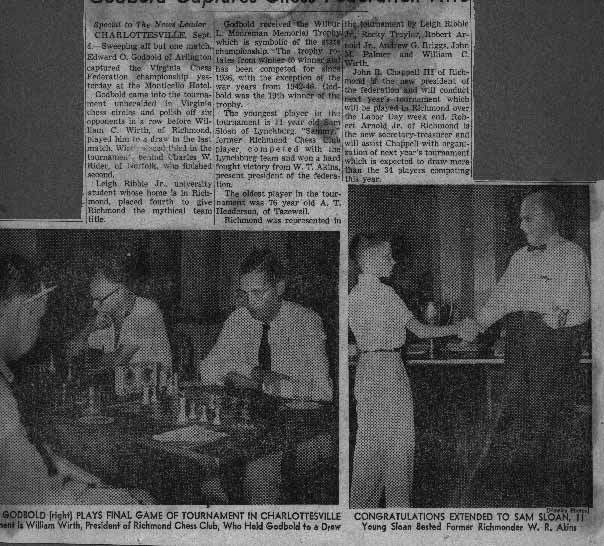 |
Just before my 12th birthday, I played in the 1956 Virginia State Championship in Charlottesville, Virginia. Thus was my second USCF rated tournament. My first had been the 1956 North Carolina Open, where I had won one game and lost three and had received a USCF rating of 1475. There was no scholastic chess at that time and all of these games were against adults.
The 1956 Virginia State Championship was a seven round Swiss held over Labor Day Weekend. Pairings were made on the lottery system. Pairings by USCF rating were not yet universal.
In one of the early rounds, probably the second round, I defeated W. R. Akins, who was the President of the Virginia State Chess Federation. Probably he had underestimated me as an opponent and had not taken the game seriously. (This was before Bobby Fischer came along. In the A.B. era, After Bobby, nobody has taken an 11-year-old opponent lightly.)
In about round five, my opponent I believe was Dr. Frank Daniel, who was a Charlottesville psychiatrist and a colleague of my mother. (My mother was also a psychiatrist).
I beat Dr. Frank Daniel. (This by the way contributed to the egomania from which I am still suffering. The fact that at age 11 I could easily beat at chess a mature man who was a medical doctor and a highly respected colleague of my mother created the delusion in my mind that I was smarter than anybody. Many chess players, not only me, suffer from this delusion.)
 |
About two-thirds way through playing over the game, we discovered that my opponent had made an illegal move. He had moved his knight two squares diagonally, like a bishop.
I told the director about this and asked him what we should do. The director did not know.
Several Virginia Chess Federation officials were called and consulted. They looked it up in the "Blue Book Encyclopedia Chess" and could find nothing about this situation.
There was a big meeting among players and officials in the tournament. Among those discussing this was Leonard Morgan of Roanoke, who was the defending Virginia State Champion.
Finally, they made a ruling. They decided that even though my opponent had been checkmated and even though my opponent and not I had made the illegal move, that the game should be replayed from the point where my opponent had made the illegal move.
However, since I had done nothing wrong, they gave me an option. I could play a completely new game, fresh from the start.
I decided to play a completely new game, because I felt that my opponent by then understood my attack and might be able to counter my strategy.
On the replay of the game, I lost easily. I lost all the rest of my games in the tournament. My final score was 1-6, one win and six losses.
However, the ruling was wrong. The officials in the 1956 Virginia State Championship were obviously not experienced. I found out at the next tournament that, inasmuch as my opponent had been checkmated, the game was over and I had won.
Here is my question: My official score in the tournament as reported was 1-6. However, I really won two games. Was my real score 1-6 or was it 2-5 ? Should I file a protest with the USCF, or is it too late since 46 years have passed?
A newspaper clipping from the Richmond News Leader dated September 5, 1956 along with a photo of me playing in this tournament is on my website at http://www.samsloan.com/akins.htm
Sam Sloan
http://www.samsloan.com/va1956.htm